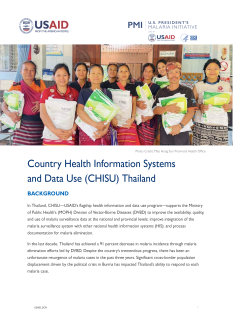BACKGROUND
In Thailand, CHISU—USAID’s flagship health information and data use program—supports the Ministry of Public Health’s (MOPH) Division of Vector-Borne Diseases (DVBD) to improve the availability, quality, and use of malaria surveillance data at the national and provincial levels; improve integration of the malaria surveillance system with other national health information systems (HIS); and process documentation for malaria elimination.
In the last decade, Thailand has achieved a 91 percent decrease in malaria incidence through malaria elimination efforts led by DVBD. Despite the country’s tremendous progress, there has been an unfortunate resurgence of malaria cases in the past three years. Significant cross-border population displacement driven by the political crisis in Burma has impacted Thailand’s ability to respond to each malaria case.
PRIORITIES
- Data integration to support malaria outbreak response. To respond to the resurgence of malaria cases in the border provinces, it is crucial that stakeholders at the provincial and district levels can access and analyze MIS surveillance data and rapidly translate analytical findings into action. CHISU supports these capabilities by developing data synthesis, analysis, and visualization tools that display subnational data and epidemiological trends. In addition, CHISU helps DVBD improve understanding of data quality, analysis, and use.
- Prevention of malaria reestablishment in high-risk areas. To ensure the human, technical, and operational capacities are in place to rapidly respond to prevent the reestablishment (POR) of malaria, CHISU supports tabletop exercises with subnational stakeholders in twenty malaria-free provinces that are at high risk for disease re-emergence.
- Improvements to national HIS interoperability. CHISU is collaborating with the DVBD, the Bureau of Epidemiology, and the Health Data Center to identify, develop, and pilot test data integration solutions to improve integration, data quality, and timeliness of access to information at national and provincial levels.
ACHIEVEMENTS AND ANTICIPATED RESULTS
- Analyzed data from six provinces, including 24 districts and 178 villages, to outline tailored recommendations to improve malaria prevention and control efforts. These guidelines are currently being used to support outbreak response and data-to-policy translation efforts in ten provinces.
- Supported monitoring visits in eight high-burden provinces, reviewing epidemiological data and discussing surveillance and malaria control challenges. These discussions will inform policy and practice recommendations in each of those provinces.
- Trained provincial staff to access and analyze malaria surveillance data, with a goal to train and empower staff in 20 provinces to utilize surveillance data to inform prevention and control efforts.
- Advised 20 malaria-free provinces at high risk for malaria re-establishment on POR plans to prevent, detect, and respond to any future malaria cases.
- Supported a subnational process in FY2024 to verify that two provinces – Surin and Mukdahan – met the criteria for malaria-free certification.


